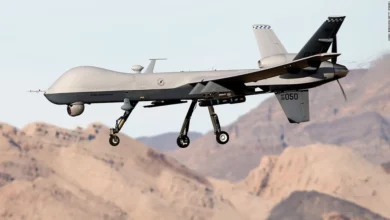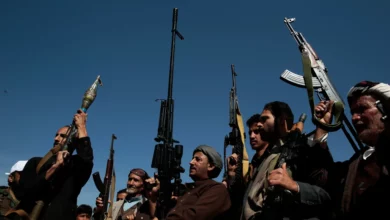As a presidential candidate in 2007, Barack Obama took part in a questionnaire about executive power distributed by the Boston Globe. In it, Obama, a constitutional law scholar, wrote, "I reject the Bush administration's claim that the president has plenary authority under the Constitution to detain US citizens without charges as unlawful enemy combatants."
Less than three years later, Obama, now ensconced in the White House, has completely abandoned that legal principle and has embraced a view of executive power that goes far beyond what he argued as a candidate was unconstitutional.
Forget imprisoning US citizens without charge. Now that he's president, Obama claims the power to assassinate US citizens without charge.
Earlier this month, the Obama administration argued before a federal court that the White House should have unreviewable authority to kill Americans anywhere in the world if it unilaterally determines they pose a threat to the United States.
Government lawyers made the claim in response to a lawsuit filed by the American Civil Liberties Union and the Center for Constitutional Rights on behalf of Nasser al-Awlaki, the father of Anwar al-Awlaki, a US-born Muslim cleric now living in Yemen.
Anwar al-Awlaki has been accused of having ties to the failed Christmas Day airline bombing and the Fort Hood shooting in 2009. Earlier this year, US officials confirmed he was one of four Americans added to a White House-approved CIA list of targets for capture or killing.
"This was essentially Obama saying, 'I, the President, hereby impose the death penalty on this American citizen with no trial,'" said Glenn Greenwald, the legal blogger for Salon.com and a former constitutional law attorney. "President Obama–with no criminal charges, no trial, no due process–has ordered [Americans] to be killed anywhere they’re found, far away from a battlefield, no matter what they’re doing at the time, on the grounds–the unproven accusation–that they’re involved in terrorism."
Nasser al-Awlaki has denied the government's claims that his son is a terrorist and is pleading to the Obama administration not to assassinate him. "I will do my best to convince my son to [surrender], to come back but they are not giving me time, they want to kill my son," he told CNN. "How can the American government kill one of their own citizens? This is a legal issue that needs to be answered."
The Obama administration initially tried to prevent Nasser al-Awlaki from bringing any legal action against the assassination policy by claiming Anwar al-Awlaki was a "specially designated global terrorist," which makes it a crime to even represent him in court. But the ACLU and CCR eventually won a license to file the suit.
"If the Constitution means anything, it surely means that the president does not have unreviewable authority to summarily execute any American whom he concludes is an enemy of the state," said Jameel Jaffer, one of the ACLU attorneys working on the lawsuit.
While the case has garnered some media attention due to the fact that al-Awlaki is a US citizen, the very notion of a White House-approved kill list, whether it includes Americans or not, undermines the very principles of international law.
"[The Awlaki case] highlights the whole problematic nature of targeted assassinations, because the fact that he’s an American actually makes no difference in terms of the international law that’s being invoked," said Philip Alston, the UN Special Rapporteur on Extrajudicial, Summary and Arbitrary Executions. "No matter what nationality, you have certain due process rights under international law."
This month it was reported that CIA and Special Operations forces are about to start ratcheting up a Predator drone campaign in Yemen, where al-Awlaki lives. Alston has been outspoken not just on targeted assassinations but on drone strikes in general.
"In a situation in which there is no disclosure of who has been killed, for what reason, and whether innocent civilians have died, the legal principle of international accountability is, by definition, comprehensively violated," Alston said in a report to the United Nations in June that called on the Obama administration to halt or scale down its drone attacks. In the first 20 months of Obama's presidency, the CIA has reportedly conducted at least 126 drone strikes–nearly triple the total number during Bush's eight years in office.
In 2002, when the Bush administration first began transferring so-called "enemy combatants" to the US prison camp at Guantanamo Bay to be held without charge, it sparked condemnation from many legal scholars in the United States and outrage around the world. But the Obama administration's expanded use of the targeted killing program that allows for the assassination of suspects–including US citizens–without any due process or judicial oversight has been met with far less vocal opposition.
If the Obama administration is making the argument in federal court that the president should have the authority to kill anyone, anywhere whom he deems a threat to the United States, it begs the question: What power doesn't he have?
Sharif Abdel Kouddous is a producer for the independent TV/radio show Democracy Now! Some of the material for this piece is drawn from interviews broadcast on the show.




